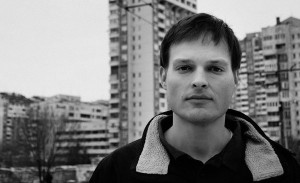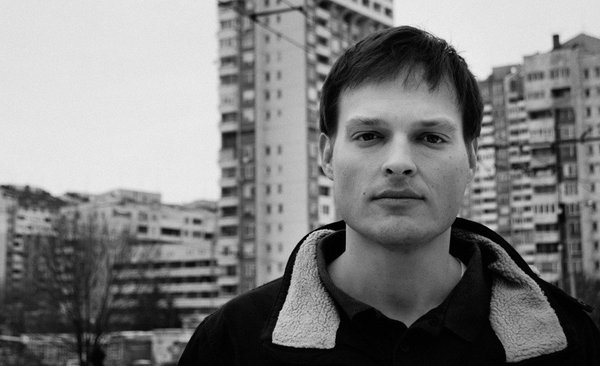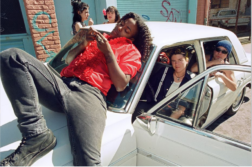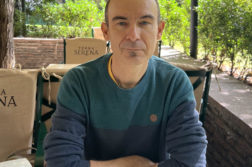IT SEEMS Garth Greenwell is having his moment. His breakthrough novel What Belongs to You, published earlier this year by Farrar, Straus and Giroux, has received rave reviews from gay and mainstream critics alike. And given that the book is about two men who meet and have sex in a public toilet—at the National Palace of Culture in Sofia, Bulgaria, no less—the accolades from straight critics become even more impressive.

A poet and author of an award-winning novella titled Mitko (2011), Greenwell holds masters degrees from Harvard and the Iowa Writers’ Workshop, where he was an arts fellow. As he explains here, the years he spent both studying and writing poetry were instrumental in the development of his prose style. He’s an avid reader of the gay canon, and it’s worth noting that he’s already being compared to some of the writers who first inspired him—Proust, Thomas Mann, and Henry James, among others.
This interview was conducted as an on-line Q&A in March.
Jim Farley: What Belongs to You is an expansion of your critically acclaimed novella Mitko (2011). Could you talk about how the story evolved into its current form?
Garth Greenwell: A revised and condensed version of Mitko is the first section of the novel. When I finished the section of the book that was published as a novella, I really didn’t have any idea that the story would continue. Every new section came as a surprise to me. The writing of the second section, which is a 41-page paragraph that explores the narrator’s childhood, was especially unexpected, both the subject matter and the form it took. Looking back, though, I can see that there were seeds for that second section even in Mitko. I was troubled, when I was revising the novella, by a strange moment I couldn’t justify, a tiny scene where the narrator watches a young girl playing with her father by a river. I thought I should probably cut it, but I couldn’t: I knew somehow, in a way I couldn’t articulate, that it belonged. It wasn’t until I was deep into the writing of the second section that I realized it was prefigured by that moment.
The third section, too, was a surprise: I didn’t realize that Mitko’s story would continue until I began writing it. It really is true that I never had a big, global sense of the book. I wrote it in two-hour shifts before I started teaching for the day (I was living and working in Sofia), and my sense was that I was feeling my way forward sentence by sentence.
JF: Despite what John Updike infamously said about gay literature being a waste of time because it’s only about “self-gratification” (i.e., non-procreative sex), you’re now part of a select group of gay authors who’ve written a classic about sexual obsession—Proust, Somerset Maugham, Thomas Mann, a few others. Not to speak ill of the dead, but do you have a rebuttal to Updike’s judgment of gay lit?
GG: It’s amazing to see my novel put in that company; thank you. As for Updike: is “judgment” the word for the unbelievably stupid things he said in that review? They were so obviously reflecting unconsidered prejudice; it’s hard to take them seriously enough to rebut them. The idea that the lives of any group of people are unworthy of literary attention is the sort of statement that should be dismissed out of hand. It certainly doesn’t belong in The New Yorker.
JF: In review after review, your book has been hailed as a masterpiece of form, one that’s been compared to everyone from Proust to W. G. Sebald. How do you respond when you see these kinds of comparisons?
GG: As a reader, for decades I’ve been listening in on those writers and the conversations their books have with each other. I certainly wrote my own book as a way to try to participate in those conversations. I would never place my book beside their achievement, but I do always want to acknowledge my debt to them.
JF: In an interview with The Guardian, you said you consider yourself a “queer writer writing in the queer literary tradition for queer people.” As someone who writes for a GLBT magazine, I loved reading that. I’ve also loved witnessing straight critics gush over a book about two guys who have sex in a public toilet on their first date! Were you surprised by the enthusiastic reception from the mainstream press?
GG: Nothing could have surprised me more. I expected that my book would sink without a trace, which is the fate of almost all books, and especially books about gay lives, with explicit gay sex. I don’t know how to explain it, except to point to the heroic generations of queer writers that made a world in which books like mine can have such a different fate from too many of theirs. I’m so grateful to those straight critics for reading the book with such generosity. I’m even more moved by the gay writers who have written about the book: Bruce Benderson, Damon Galgut, Aaron Hamburger, as well as younger writers like Jameson Fitzpatrick and Jeffrey Zuckerman. It’s really the greatest honor of my life to have my book be the occasion for that kind of conversation.
JF: In the same Guardian interview you mentioned that you started cruising for gay sex in Kentucky when you were fourteen. What was that like?
GG: Cruising gave me my first sense of identity as a gay person and (the two are related), my first experience of queer community. I had experiences of intimacy in parks and bathrooms in Kentucky that felt real then and still feel real today. I want to write more about those communities and the men I met in them. I also want to write about the ways in which I think cruising was a kind of training for writing.
JF: I read your book over the course of a single day and thought it was one of the best novels I’d read in years, but I must confess that I had to keep putting it down because it was so painful at times. Was it painful to write?
GG: Thank you so much for reading it so generously. Writing the second section, which explores the landscape of my childhood, was pretty harrowing. When I finished the first draft, I had to put it away for more than a year. I do think that vulnerability is a prerequisite for meaningful writing, and I hope I write in a way that is open to pain. Though not only pain.
JF: On that note, another painful book that’s getting a lot of buzz lately is Hanya Yanagihara’s A Little Life, which, as far as the plot goes, reads like something the Marquis de Sade might have cooked up. What is it about bleak fiction that’s so compelling?
GG: I think A Little Life is among the most remarkable books of the last decade, and I have to say, any time somebody talks about my book being bleak, I want to send them Yanagihara’s way. The poet Jane Kenyon writes beautifully somewhere about the consolation even very sad art gives: the consolation of form, the consolation of witness, the consolation of finding that emotions you’ve had or things you’ve suffered have been shared with someone else. All that said, my own experience of reading Yanagihara’s book is not really one of unremitting bleakness. There’s humor in that book, and there’s an awful lot of love. Maybe that’s why I think it’s such a powerful book and finally not an entirely bleak one: because it believes so uncompromisingly in love.
JF: A major reason What Belongs to You has such a visceral effect on the reader is because the sentences work like a series of Russian nesting dolls full of introspection and contemplation, allowing the narrator to gradually reveal layer upon layer of thought before reaching a deep emotional core—like reading Proust or Henry James. I’m curious to know how you developed this distinctive style, which paradoxically feels both highly original and like something from a previous era.
GG: That’s a beautiful description of the book’s style; thank you. I think there are a few things that created a love of a certain kind of syntax in me. The first is opera, which I studied before I began to write, and which offered a pretty good education on the expressive potential of long lines. The second is poetry, which I wrote for many years. Finally, when I was at Harvard doing my doctorate, I was studying Renaissance literature, and I spent many hours examining the sentences of Milton, Thomas Browne, John Donne’s sermons. I love the music of those sentences, and I wanted to bring that music into the 21st century. So yes, old and new: I hope that’s right.
JF: Were there any particular operas or arias you listened to for inspiration while you were working on the novel?
GG: The operas of Benjamin Britten, especially his chamber operas. Turn of the Screw and The Rape of Lucretia are perfect dramatic works, so far as I’m concerned. Britten’s music models a kind of thinking that appeals to me a great deal: he works and reworks the same ideas again and again, developing them through a process of correction and accrual. I think there’s a reason he’s so drawn to writers like Thomas Mann and Henry James.
JF: Your sentences have a precise rhythm and symmetry to them. When you combine such controlled syntax with the narrator’s brutal frankness, especially when it comes to sex, the results can be electrifying, like the fictional equivalent of confessional poetry. Could you talk about the impact your poetry background has had on your prose style?
GG: Three of my teachers were Frank Bidart, Carl Phillips, and Jorie Graham, all of whom are, in very different ways, obsessed with expansive syntax. Studying poetry with them, both in the classroom and by reading their work, was a kind of master class in the possibilities of the English sentence. And not just that: also in a willingness to approach difficult subject matter, including sex; also a willingness to be vulnerable on the page.
I do think What Belong to You is a poet’s novel, not just in the shape of the sentences or the narrator’s explicit ruminations on poetry, but also in the way it approaches narrative. Some readers have remarked upon the fact that there’s a lot of information we don’t get about my narrator that novels usually give: his name, for starters, but also more of his background (after his childhood)—things like what brought him to Bulgaria. I think that’s largely because I was a poet for so many years, and in poems you just don’t worry about a lot of that stuff. I think it just didn’t occur to me to miss it.
JF: I think this lack of specificity also has the effect of making the narrator more of an Everyman. Do you think that partly explains the book’s universal appeal?
GG: Helen Vendler, who was my teacher at Harvard, has argued that part of what defines a lyric poem is the way anyone can inhabit it as a speaker. I’m not sure if that’s really my experience of reading, though. I like a narrator or a speaker who resists me a little bit, who won’t dissolve into my own sense of myself. That’s part of the great pleasure of reading for me, the experience of another consciousness that remains other. I don’t know if I can ever really believe in the meaning of a word like “universal”: I think it hides too much. That said, I think any time a writer roots into a particular character’s experience of something like desire, that experience is going to strike a chord for a great many people.
JF: By any chance are you a fan of Bruce Benderson’s The Romanian (2004), his memoir about his infatuation with a straight Eastern European hustler that won the Prix de Flore in 2004?
GG: A friend told me to read that book after he read Mitko, and I fell in love with it. I think it’s tremendous. I think Benderson’s importance as a writer has never really been acknowledged in the States. I know that he has a collected stories coming out sometime soon; I hope it will occasion a lot of career retrospectives. He’s a great writer.
JF: Death in Venice seems to have cast a long shadow on What Belongs to You. Was that something you were conscious of while you were writing it?
GG: Death in Venice is one of my favorite books, and it’s certainly one of the books I hope What Belongs to You is in dialogue with. In my last semester at the American College of Sofia, I taught a class dedicated to the book. But, in fact, I first encountered Death in Venice not through Mann’s novella but through Benjamin Britten’s very great opera. I think that work has probably had a profounder influence on me than the book.
JF: You’ve said in interviews that your book is somewhat autobiographical but that the narrator isn’t you. Is there a real-life Mitko?
GG: The book is playing with the line between fiction and nonfiction, and part of the æsthetic pleasure of that, I hope, lies in never being sure of what side of the line something like that falls on. I feel like it would be a betrayal of that pleasure to answer the question.
JF: Your book addresses transactional sex in a gut-wrenching way, both in terms of the narrator’s longing for someone who’s either unable or unwilling to match the intensity of his desire and in terms of the abysmal economic situation in Bulgaria, which compels attractive young men like Mitko to become prostitutes. Were you making a more general statement about sexual exploitation by having the book end on a more optimistic note for the narrator than for Mitko?
GG: I think it’s very hard to say anything adequate to the complexity of sex work. I wanted to write a book that makes clear how at every point in a transactional encounter, both parties—the sex worker, the john—are fully human. We live in a world and an economic system in which exploitation is built into the very fabric of our days: all of our comforts and freedoms in the West depend upon the exploitation of vulnerable people, from the clothes we wear to the food that fills our stores. Sex work as explored in my novel is a face-to-face encounter between two human beings, each of whom has desires and complicated motives and varying capacities of ethical response. The narrator’s great, brutal privilege comes with his American passport: he can leave, and Mitko can’t. The arc of the book’s final section is his grappling with the question of how willing he is to bind his destiny to this man and this place. I don’t think he’s heartened by what he discovers.
JF: Is Mitko gay? He never claims to be straight, but he doesn’t seem comfortable identifying as gay either, presumably because of the widespread homophobia in Bulgaria. And when he was on those gay cruising sites at the narrator’s apartment, it was unclear to me whether he was on them for business, pleasure, or both.
GG: I guess I do think of Mitko as gay, which is part of what interests me about him as a character. Early on, the narrator says that Mitko seems to lack any “squeamishness about existence,” a phrase I stole from Fernando Pessoa. Part of that is his apparent comfort with his sexuality. In the context of a very homophobic culture, I think Mitko’s readiness to talk about having had a romantic relationship with another man is pretty radical. On-line, Mitko does use those social media sites to set up dates with johns, but he also uses them to connect with the on-line community of young gay men from across the country.
JF: How has the book been received in Bulgaria so far?
GG: The book will come out in Bulgarian translation in the fall, and I’m hoping to be there for the release. The fate of books in Bulgaria is the same as in America: nearly all will quickly vanish. If my novel gets any attention at all, it will be that of scandal: it’s a novel about a teacher at the country’s most famous school and his relationship with a male prostitute.
It is also nearly the first novel to address the lives of gay people in Bulgaria in a way that affirms the dignity of those lives. Nikolai Boikov’s Pisma do Petar (“Letters to Peter”) is the only Bulgarian novel I know of that does this. On the one hand, it’s very strange that a foreigner should write this novel. On the other, it’s my foreignness that made it possible for me to write it. If I were a Bulgarian writer, it would be devastating for my first book not to be received as literature but merely as scandal.
Since my book has its primary life in English—where it isn’t scandalous at all—it doesn’t bother me so much to think of the response it might receive in Bulgaria. In fact, I welcome it. And, since I speak Bulgarian and have been steeped in activism for two decades, I want to be there to try to articulate the reasons why these lives belong in literature.
I hope my book is never seen as an authoritative or adequate representation of gay experience in Bulgaria. It’s a foreigner’s book, centered on a foreigner’s experience. And really, my greatest hope is that gay writers in Bulgaria will read it and think: “This isn’t what it’s like at all; this American got it all wrong”—and that they will write books that get it less wrong. And maybe the discussion around my novel will make it possible for their work to be received as literature, not merely as provocation. That would be the happiest possible fate for my book in the world.
JF: Do you think there will be more Mitko’s in the narrator’s life?
GG: I’m exploring this narrator further in my current projects, so maybe we’ll find out.
JF: In his recent New York Times review of the book, Aaron Hamburger groups you in with currently fashionable writers Ben Lerner and Karl Ove Knausgaard, perhaps the two most famous practitioners of what Hamburger calls the “all-over” writing method, a style in which “work [is]merely lifted from the authors’ lives and flung directly onto the page like paint on a [Jackson] Pollock canvas.” Would you agree with this characterization?
GG: I’m so grateful to Hamburger for his beautiful review of my book, which moved me more than I can say. I haven’t read Knausgaard yet, but I admire Lerner very much, and it’s an honor to have my work discussed alongside his. I think one thing I admire about it, and something that I hope is true of my book as well, is that Lerner seems open to the possibility of meaning arriving suddenly anywhere, including in the most apparently banal places. You have the sense, reading him, that he’s possessed of a kind of hyper-attuned sensibility that makes poetry out of everything. That’s what I understood Hamburger to be talking about in his discussion of Lerner’s work, and I think it’s a beautiful model for a writer, really—or for anyone.
JF: In what ways has your life changed since the book came out? Is it harder to cruise tearooms now?
GG: Ha! Everything about the last several weeks has been a blur—a happy blur, but an exhausting one. I’m so grateful for the chance to travel and meet people who have read my book, but I’m a little freaked out by how completely this process feels like the opposite of writing. I’m very eager to find my way back to the privacy necessary (or necessary for me) for making art.
Jim Farley is an associate editor of this magazine.






